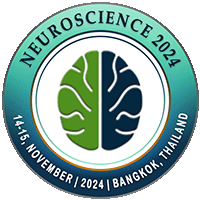
Anahí Chavarría Krauser
Facultad de Medicina, Universidad Nacional Autónoma de México, MexicoTitle: Silymarin improves post-cerebral ischemia survival and increases BDNF levels in obese mice
Abstract
Obesity-associated systemic inflammation causes secondary neuroinflammation, a risk factor for developing other brain pathologies like cerebral ischemia. Silymarin, an extract from the plant Silybum marianum, has anti-inflammatory, antioxidant, and neuroprotective properties and could reduce neuroinflammation secondary to obesity. This work aimed to evaluate if obesity induced neuroinflammation can be a factor in cerebral ischemia prognosis and if oral administration of silymarin can modulate it. Male C57/Bl6 mice were fed a high-fat diet (HFD) for 12 weeks. Fasting glucose and intraperitoneal glucose tolerance test were determined after 12 weeks of diet. 100 mg/kg of silymarin was administered orally daily for 14 days. HFD-induced obese mice were submitted to photothrombosis to induce cerebral ischemia and then treated for 14 days with silymarin. BDNF, MCP1, TNF?, CX3CL1, and IL10 were determined in the cerebral cortex with ELISA. HFD mice presented altered fasting glucose and intraperitoneal glucose tolerance test. Also, HFD mice had higher cortical levels of IL10 and BDNF, which decreased after silymarin treatment. Although cortical TNF?, MCP1, and CX3CL1 levels were not different between the untreated groups, a marked decrease was observed after silymarin administration. HFD mice presented higher mortality after photothrombosis-induced cerebral ischemia than control mice, and silymarin treatment diminished mortality in both groups. Cerebral ischemia reduced cortical BDNF and IL10 levels while MCP1 and CX3CL1 were increased. Silymarin treatment increased BDNF levels while not affecting IL10 and only increased CX3CL1 in the HFD with cerebral ischemia group. At 14 days post-ischemia, no relevant differences were observed regarding TNF?, and silymarin treatment did not affect TNF? and MCP1 levels. In conclusion, obesity impacted post-ischemia survival and silymarin improved survival. Funding: CONACYT Ciencia de Frontera 2019 (1783) and Universidad Nacional Autónoma de México PAPIIT (IN214821).
Biography
Anahí Chavarría is a Full time Professor at the Unidad de Investigación en Medicina Experimental, Facultad de Medicina, Universidad Nacional Autónoma de México. She has a medical degree and Ph.D., and her focus in research is the impact of systemic inflammation on neuroinflammation and associated neuropathologies like Parkinson's disease and cerebral ischemia. In addition, she studies how neuroinflammation can be modulated by silymarin, an extract obtained from Silybum marianum with antioxidant, anti-inflammatory, and neuroprotective properties.

